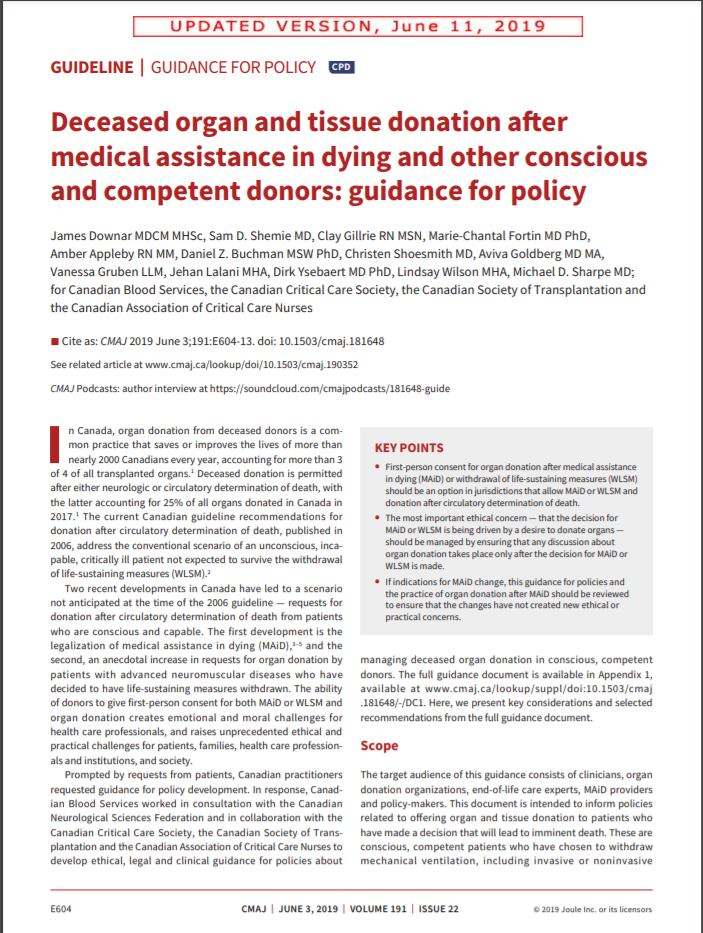Organ and tissue donation by those who choose medical assistance in dying: new guidance for professionals

A new publication in CMAJ (Canadian Medical Association Journal) aims to help health care teams navigate clinical issues surrounding organ and tissue donation by patients who choose to donate after medical assistance in dying (MAID) or withdrawal of life-sustaining measures.
In collaboration with the Canadian Critical Care Society, the Canadian Society of Transplantation, and the Canadian Association of Critical Care Nurses, Canadian Blood Services brought together medical, legal and ethics experts to inform this work, as well as patient partners who brought unique perspectives and thoughtful insight.
The new publication, Organ and Tissue Donation for Medical Assistance in Dying and Other Conscious Competent Patients: Expert Guidance for Policy, makes key recommendations, including:
- Protection for patients – the decision to have MAID or withdrawal of life-sustaining measures must occur before any discussion of organ donation.
- Choice – medically suitable conscious competent patients who provide first-person consent to end-of-life procedures should be given the opportunity to donate organs and tissues.
- Consent – the patient must be able to provide first-person consent and be able to withdraw consent for MAID or donation at any time.
- Donor testing – physicians, transplant teams and other staff should try to minimize the impact and disruption of donating (such as testing) for the patient.
- Determination of death – the dead donor must be respected, meaning vital organs can only be removed from deceased donors after determination of death according to accepted criteria.
- Conscientious objection – health-care professionals may choose not to participate in MAID or withdrawal of life-sustaining measures, but they should work to support the patient’s wishes to donate.
For access to professional education resources related to leading practices and clinical guidelines visit Canadian Blood Services' professional education website.
This report and the published manuscript have been endorsed by the Canadian Critical Care Society, the Canadian Society of Transplantation, and the Canadian Association of Critical Care Nurses.
|
|
|
Learn more: CMAJ podcasts — Organ Donation After MAID
In this interview, Dr. James Downar (co-author of policy guidance) and Dr. Jennifer Hancock (an intensive care physician in Halifax) take listeners through considerations of having a patient who requests medical assistance in dying (MAiD) or withdrawal of life-sustaining measures (WLSM) and who also requests to have his or her organs donated.
https://soundcloud.com/cmajpodcasts/181648-guide
Canadian Blood Services – Driving world-class innovation
Through discovery, development and applied research, Canadian Blood Services drives world-class innovation in blood transfusion, cellular therapy and transplantation—bringing clarity and insight to an increasingly complex healthcare future. Our dedicated research team and extended network of partners engage in exploratory and applied research to create new knowledge, inform and enhance best practices, contribute to the development of new services and technologies, and build capacity through training and collaboration. Find out more about our research impact.
The opinions reflected in this post are those of the author and do not necessarily reflect the opinions of Canadian Blood Services nor do they reflect the views of Health Canada or any other funding agency.